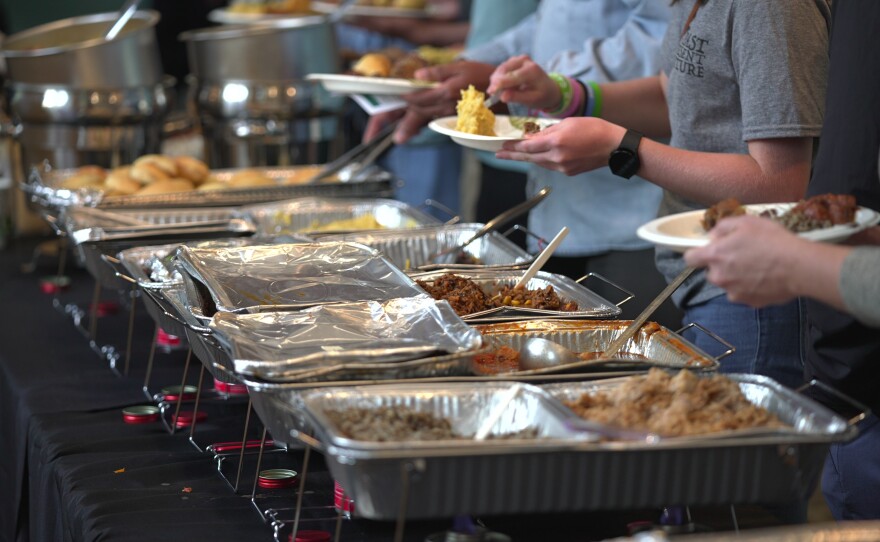TRANSCRIPT OF VIDEO
YOUNG GIRL: I'm going to do a double knot.
WOMAN 1: Yep, tie me up, babe.
WOMAN 2: Nice to see you.
WOMAN 3: And the other one goes here.
TROY WIIPONGWII IN VIRGINIA ALGONQUIAN: I come from Tsenocomecah. I come from the Chickahominy people
TROY WIIPONGWII: That is my version of an introduction in Virginia Algonquian.
ADRIENNE McGIBBON: This feast was all about reclaiming what's been lost. Organizers say what's happening here is revolutionary.
TROY WIIPONGWII: You being here is just a part of, really a revolution, as we start to reclaim our food pathways as Indigenous people but as people who are just trying to save the planet as well.
ADRIENNE McGIBBON: Troy Wiipongwii works at William and Mary's Institute for Integrative Conservation. He came up with the idea of a feast, hoping to spark a movement.
TROY WIIPONGWII: And it really just seemed like there was something there. And maybe having a large feast to, kind of, direct everyone's attention to all of these diverse efforts around food sovereignty.
ADRIENNE McGIBBON: Food sovereignty is all about rejecting industrialized practices around food. The movement encourages growing healthier food without chemicals, in a more sustainable way. The idea is being embraced and promoted by many Indigenous communities.
TROY WIIPONGWII: We live in a very interconnected world, where something as simple as the spices we use on our table, come from thousands and thousands of miles away. And there's just such a diversity of food that exist here.
ADRIENNE McGIBBON: Culinary educator and historian, Joe Rocchi, has spent the last decade researching foods that are native to the Americas.
JOE ROCCHI: So many things from Native American history revert back to Native American foods. They did change the face of the planet. Three-fifths of the world's food came from here. Could be served hot or cold.
ADRIENNE McGIBBON: Rocchi is a Pamunkey tribal member. He cites foods like tomatoes, potatoes and chili peppers, items more commonly associated with Italian, Irish and Asian dishes. He says, they were all foods grown by native tribes and exported by colonizers, from the new world.
JOE ROCCHI: And it's ironic that now that we think of other cultures and we can't even separate their foods from our own. But our foods changed everything.
ADRIENNE McGIBBON: Now, Rocchi wants to reclaim those ingredients.
JOE ROCCHI: It's rediscovery of the history that has purposely, for one reason or another, been taken away. It's a huge part of culture that's not there.
GINGER CUSTALOW: And you get scalloped potatoes with your meat pie.
ADRIENNE McGIBBON: Lonnie Custalow and his wife, Ginger, own a Virginia business that relies on Native traditions for inspiration. They're also serving at the feast.
LONNIE CUSTALOW: Mainly the foods that I was eating as a child with my grandfather, was wild game, fresh fish. So, what we do here is, we're taking those type of foods and incorporate into a modern type of dish for people.
ADRIENNE McGIBBON: Custalow grew up on the Mattaponi Reservation in King William County, with his family.
LONNIE CUSTALOW: We fished, we hunt, we trapped. We grew gardens, we canned our food. We even canned meats.
ADRIENNE McGIBBON: In 1974, "National Geographic" called Custalow's grandfather, “the last Virginian to live entirely off the land”.
LONNIE CUSTALOW: Well, I went with my grandfather every single morning and every spring, it was a routine of about six weeks of fishing. Every day we would fish three tides a day, to catch the fish, not only to supply food for ourselves but also to sell for income.
ADRIENNE McGIBBON: In 2022, the Custalows opened their winery, the Mattapony Reserve. It's one of only a few native-owned and operated businesses in Virginia, that's serving Indigenous foods. While they don't catch and grow everything they serve, they do source much of their ingredients locally.
LONNIE CUSTALOW: We know where it comes from. We can speak to the owners who provide the meats and things that we purchase for our foods here. So it's just a connection.
ADRIENNE McGIBBON: Another organization that partnered to put on the feast, is all about growing local.
BENJAMIN FRITON: This is Sumac.
ADRIENNE McGIBBON: Ben Friton runs the REED Center for Ecosystem Reintegration. It's a 160-acre parcel of land in Maryland, used for sustainable agricultural practices.
BENJAMIN FRITON: Our goals here are, growing food that grows itself. We want to create a self-perpetuating agricultural system. A system that, over time, only increases the amount of food that it's able to produce.
ADRIENNE McGIBBON: Instead of just growing one crop, which is a common modern agricultural practice, The REED Center explores growing multiple plants in one space. It's a centuries old practice that Friton says, is better for the soil and for our nutrition.
BENJAMIN FRITON: What was that ecosystem and how was it able to thrive for thousands of years before we started turning it into whatever we're growing as annual crops now?
ADRIENNE McGIBBON: Friton is trying to recreate those landscapes here. He says, rethinking how we grow our food is imperative. In fact, he calls it, a matter of national security.
BENJAMIN FRITON: One of the most important things that I think needs to happen as a Homeland Security initiative, is to have hyperlocal sustenance infrastructure.
ADRIENNE McGIBBON: The ultimate goal is to encourage people to replicate these systems on a smaller scale, in their communities and backyards.
BENJAMIN FRITON: If we don't start thinking about food as part of our infrastructure, as part of our homeland security, the cities that currently have three or less days of food stocks, are susceptible in a globalized food system, to all kinds of very chaotic outcomes that I don't think any of us would like to witness.
ADRIENNE McGIBBON: One positive outcome from the pandemic, more Americans have begun growing their own food. Now, more than two in five US households are cultivating their own vegetables, fruit, berries or herbs. One Nottaway tribal leader is helping people interested in backyard gardening.
BETH ROACH: We can't all go full traditional but we can certainly weave some of our traditional foods into our current diet.
ADRIENNE McGIBBON: Beth Roach started an organization called the Alliance of Native Seedkeepers. It's a network of people committed to growing and sharing native seeds. We met up with her, at her tribe's annual powwow.
BETH ROACH: The important thing is going through the whole cycle of picking your seed, getting your soil right, putting that seed in the ground, starting it, you know, see it grow, keep watering it.
ADRIENNE McGIBBON: Roach says, eating food you've grown, helps connect you with nature and with ancient traditions. She says the feast celebrates both of those things.
BETH ROACH: The feast is a highlight of our cultures from long past, but it also gives us an opportunity to talk about how we're still doing our food ways today.
ADRIENNE McGIBBON: Wiipongwii hopes to take advantage of that opportunity, by bringing chiefs, chefs and scientists together, for many more feasts. With the hopes of enjoying Indigenous food, sharing knowledge and growing the food sovereignty movement.
TROY WIIPONGWII: Bringing people together to really build a coalition around one of the human activities that has the most damaging impact but the most important activity that we engage in on a day-to-day basis. And that narrative of how we move forward, is why a feast like this is important.
Resources:
William & Mary’s, Institute for Integrative Conservation
The Reed Center for Ecosystem Reintegration
Alliance of Native Seedkeepers
This updated version of this story identifies Lonnie Custalow as the co-owner of the Mattapony Reserve.








